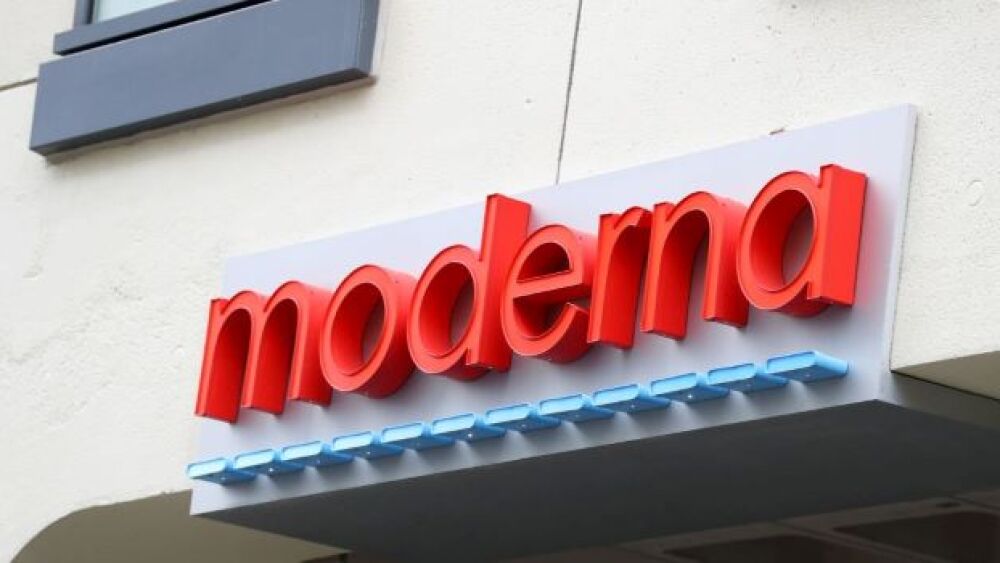Moderna is still fending off patent challenges over the lipid nanoparticle delivery system used in its COVID-19 vaccine.
Maddie Meyer/Getty Images
Moderna is still fending off patent challenges over the lipid nanoparticle delivery system used in its COVID-19 vaccine, Spikevax. This began in February when Genevant Sciences and Arbutus Biopharma filed patent challenges.
In a statement, Moderna said, “The claims brought by Genevant and Arbutus are unfounded because Moderna’s COVID-19 vaccine does not infringe any valid patents.” In a filing, Moderna sought to have the lawsuits dismissed claiming the two companies “have sued the wrong party in the wrong court.”
By this, they mean that if patent holders are seeking claims against the government-contracted suppliers, they need to sue the government in the U.S. Court of Federal Claims.
Moderna added, “This law provides an important statutory protection for authorized government suppliers and played a critical role in encouraging companies, including Moderna, to step up and help the Government fight the COVID-19 pandemic.”
Moderna also battled a patent challenge from the National Institutes of Health (NIH). The NIH claimed they should be co-patent owners of the mRNA vaccine because of their involvement in its RNA sequence. This involves a different component of the vaccine than the claims made by Genevant and Arbutus.
Moderna argued that it recognized the “substantial role” that the NIH’s National Institute of Allergy and Infectious Diseases (NIAID) scientists played in developing the vaccine and those contributions are highly valued. In addition, Moderna had included NIAID researchers on some patent applications when the company made “inventive contributions.”
However, Moderna did not agree that NIAID researchers co-invented the mRNA sequence of the vaccine. They argued they had picked the mRNA sequence without the input of government scientists “who were not even aware of the mRNA sequence until after the patent application had been filed.”
After the NIH said the agency would defend its claims, Moderna pulled the patent application. It had previously dropped the three NIH scientists included in the patent application.
In a statement at the time, Moderna said, “The Company would like to avoid any distraction to the important public-private efforts ongoing to address emerging SARS-COV-2 variants, including Omicron.” It also filed a continuation that would allow discussions over the patent at a later date. In other words, they kicked the can down the road to be dealt with at a later time.
Moderna, which currently has no other product on the market, brought in $17.1 billion in vaccine sales in 2021.
In its suit against Moderna, Arbutus argued that their researchers Genevant had spent years “developing and refining” the lipid nanoparticle (LNP) delivery technology it then licensed to multiple parties. LNPs are essentially microscopic fat particles that carry the mRNA coding for the SARS-CoV-2 spike protein used in the vaccine.
In its announcement, Arbutus stated, “With this technology, the RNA can travel through the human body to a target cell and through the target cell’s membrane before releasing the RNA. Without this crucial delivery technology, the RNA would quickly degrade in the body and be ineffective.”
In a February statement, Moderna said, “Moderna denies these allegations, and will vigorously defend itself against Genevant’s claims in Court. Our COVID-19 vaccine is a product of Moderna’s many years of pioneering mRNA platform research and development, including the creation of our own proprietary lipid nanoparticle delivery technology, which has been pivotal to combat the COVID-19 pandemic.”
Moderna continues to argue that even if Genevant and Arbutus refiled in the U.S. Court of Federal Claims, the suits would fail because they had not infringed any patents.
Genevant indicates it will object to Moderna’s motion to dismiss. The Wall Street Journal reported that Genevant said, “Rather than respond to the substance of our claims, Moderna is trying to shift responsibility for its patent infringement to the U.S. taxpayer.”





